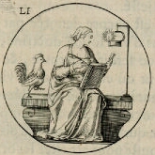Ex bibliotheca R. Toinet

Raymond Toinet (1843-1936) was a lawyer from the town of Tulle in central France. In 1880, he was one among several hundred Catholic magistrates who resigned their posts to protest anticlerical government decrees. At the age of 37, Toinet quit a brilliant public career and returned to his hometown, where he would spend the rest of his long life. He continued to practice as a lawyer for another 20 years, but devoted much of his time and energy to his “hobbies”: composing music and collecting books.1 Scholars of 17th-century French literature know him mostly as the author of two thorougly annotated bibliographies, Quelques recherches autour des poèmes héroïques-épiques français du dix-septième siècle (Tulle: Crauffon, 1899-1907) and “Les Écrivains moralistes au dix-septième siècle” (Revue d’Histoire littéraire de la France, 1916-1918). Many of the books recorded in these publications are designated as belonging to Toinet’s personal collection (“ex meis“); some are difficult to locate anywhere else.
In the 1920s, aiming to strengthen its holdings in European literature, the Library of Congress became interested in the collection methodically assembled by Raymond Toinet. Following several years of negotiations with his son Joseph, it was bought en bloc for a mere $2000, an acquisition highlighted in the Librarian’s Report for 1929:
The collection, comprising 2,518 volumes and pamphlets, is made up largely of seventeenth century French literature, although there is a representative group of books printed toward the end of the sixteenth century, as well as several hundred eighteenth and nineteenth century books. It is especially comprehensive in the works of the minor lyric and epic poets of the seventeenth century, and also includes works of the satirists and moralists of the same period. Of special interest are 163 mazarinades in verse […] we are impressed by the number of editions in the Toinet collection that are apparently not to be found in the Bibliothèque Nationale.2
The best guide to the collection remains Toinet’s own manuscript Catalogue de ma bibliothèque du dix-septième siècle, of which a typewritten copy can be consulted in the Rare Book Reading Room (Reference Z997.T6682 1929). It lists 1896 titles arranged by genre, from poetry (more than 800 titles) and theater to moralistic texts, narrative prose, travel writing etc. The website of the Library of Congress currently provides only a minimal description of the collection, without any finding aid or inventory. A search for the keyword “Toinet” in the online catalog brings up no more than 280 pre-1929 books: in these cases, the catalog record includes a reference to the collector, typically in the form “Ex bibliotheca R. Toinet.” But the bulk of the collection is not identifiable in this way, the other titles appearing online without provenance information. (The old card catalog contained more detailed descriptions.)
On the other hand, records of books allegedly from Toinet’s collection can be encountered in many other library catalogs in the English-speaking world – apparently due to a widespread practice of borrowing title citations from the Library of Congress and not cleaning up the copy-specific notes. The error persists when these books are made available online (in HathiTrust or the Internet Archive): the records include the note “Ex bibliotheca R. Toinet” but closer examination shows this to be invariably wrong.
No less confusing is the fact that many ex-Toinet books now appear in Gallica, the digital repository of the French National Library. Since 2007, Gallica indeed includes hundreds of titles digitized from the microfilm set French Books 1601-1700 (225 reels produced by General Microfilm Co./OmniSys Corp., Massachusetts), a series that appears to draw heavily from the Toinet collection in the Library of Congress. Unfortunately, nothing in the Gallica records indicates the physical location and characteristics of these micro-digitally reproduced books. Whereas the microfilm reels include the original catalog card for each book, all this information has disappeared in the Gallica version, and the only “source” and “provenance” mentioned is “Bibliothèque nationale de France.”
Copy-specific information is always helpful, but especially in the case of the Toinet collection, since many of its volumes are not only rare but contain unique features, such as owners’ inscriptions or other manuscript additions (not to mention the notes inserted by the collector-bibliographer himself). To present just one example, Toinet’s copy of vol. 2 of the Poësies de Madame Deshoulières (1695) ends with a manuscript poem that is also noticeable in the digitized microfilm but best read in the original:
Today, 88 years after being transplanted from the home of a provincial amateur to the vaults of a national library, the Toinet collection is paradoxically both omnipresent and near-invisible. If a doubt arises about the history and whereabouts of a rare book of 17th-century French poetry or morals, chances are that it was once in Tulle and is now in Washington, DC.
Volker Schröder
April 14, 2017
Footnotes
1. Paul Toinet, Un Musée bourgeois: Histoire d’une famille tulliste, Tulle: Éditions de la rue Mémoire, 1998.
2. Report of the Librarian of Congress for the Fiscal Year Ending June 30, 1929, Washington: United States Government Printing Office, 1929, p. 38-39. See also Louis van Delft, Le Moraliste classique: essai de définition et de typologie, Genève: Droz, 1982, p. 59-60.




Great essay. Very helpful. Thank you.